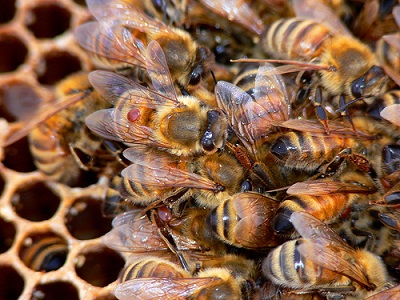
Support justice-driven, accurate and transparent news — make a quick donation to Truthout today!
 BugMan50 / Flickr)” width=”400″ height=”300″ />Close-up of honeybees. (Photo: BugMan50 / Flickr)The Big Six agrochemical companies have turned the honeybee into a factory animal, a workhorse that cannot exist without antibiotics, and are using the term “Colony Collapse Disorder” to cover the poisoning of pollinators vital to agriculture.
BugMan50 / Flickr)” width=”400″ height=”300″ />Close-up of honeybees. (Photo: BugMan50 / Flickr)The Big Six agrochemical companies have turned the honeybee into a factory animal, a workhorse that cannot exist without antibiotics, and are using the term “Colony Collapse Disorder” to cover the poisoning of pollinators vital to agriculture.
It is only by fiat of a corporate-captured EPA, a bought press and willed ignorance that colony collapse continues to be known as a bee “disorder.”
Neonics, systemic pesticides that work through a neurotoxin, which is applied to the seed of a plant and taken up into all its tissue so that the insect is exposed at every turn to a new vehicle bearing the same poison, work in a very orderly manner indeed. Poisoned food crops and the honeybees that pollinate them are perfectly efficient bearers of the values of the Big 6 – Monsanto, Dow, BASF, Bayer, Syngenta and DuPont. The empty beehive isn’t mysterious. It is no magician’s cabinet. The bees aren’t disordered – they are designed. There is, that is, no Colony Collapse Disorder (CCD).
But CCD is something. It is a vocabulary of power that sets down rules regarding who may speak, what we speak about, and the conditions of that speech. Power is not “about” objects such as wooden boxes; it concerns, more precisely, their very possibility. In service to power, CCD-speak has naturalized the biases of Big 6, helping to consolidate its hegemony over our food web. As a discourse, it has created the conceptual ground for a wholly privatized and administered creature, existing only by the arbitrary whim of the market.
The philosopher Theodor Adorno called this kind of world, where the profit motive pervades every level of society, the administered world. To a great extent, honeybees are already an administered creature. Man has turned the bee into a factory animal, a workhorse that cannot exist without antibiotics and careful breeding. This reduction of honeybees to migratory worker has enfeebled them. The unmitigated use of neonicotinoids over the last 15 years is rendering them extinct.
In its attempt to cover up this state of affairs, Big 6 treats the beehive as a magician’s box. Its favorite rhetorical tricks are the red herring – distraction from the problem at hand – and ignoratio elenchi, a logical fallacy whereby a related – yet irrelevant – point is proven. The diversionary content, that honeybee decline is caused by varroa mites, lack of adequate flora, poor nutrition, antibiotics, and in-breeding, valid on its own terms, is, in fact, a well-worn list of criticisms of industrialized beekeeping, here used to deflect the fact that neonicotinoids have decimated honeybee colonies. Another trick, “pseudo-science,” pretends to address the neonic issue, cherry-picking non-peer-reviewed studies to deny the pesticides’ toxicity. These sophistries are typical of administration’s magic box: The false back asserts a transparency that is, in fact, opaque; the compartment isolates and fetishizes the context-less “fact.”
In its PR campaign, where it dutifully musters up an iconography seemingly interested in the sustainability of human life, Big 6 adopts a happy face that mimics the language of ethics. But appropriately, the images it proliferates via social media are an invitation to alienation: blimps, hot-air balloons, skydivers, in short, fetishes of a paradoxically “earth-free” leisure. Here also, corporatism’s hostility to life is revealed, despite its feints of affect and affiliation. Its sentimentalism is, like much sentimentalism, sadism’s party dress; its images advertisements for an arid world evacuated of life- and mind-sustaining biodiversity.
We, mere citizens, are counted on for our apathy and cynicism: to remain distracted consumers or crumb-eating activists. We are expected to passively accept, either unaware or with regret, the turning of the world into a precarious contradiction inverting the valuation of life and death; a world in which toxic pesticides are self-evident, living beings fungible, and the most basic questions of our survival negotiated according to a bleak economistic logic.
Like it or not, neonics are chemical predators. To treat them as our fate, as Big 6 does, is to cut us off from sustainable sources of nourishment in the present as well as to renew Big 6’s lease on future generations’ sustenance. This sustenance is not only material. It upholds the very seat of our imaginations and our capacity for critical thought. Until we refuse the manipulative discourse of CCD and reject Big 6’s pesticides, we will see many more empty wooden boxes in bee yards. And they will continue to be an emblem of our own de facto status as scouts in the dead zones of Big 6’s empire.
Press freedom is under attack
As Trump cracks down on political speech, independent media is increasingly necessary.
Truthout produces reporting you won’t see in the mainstream: journalism from the frontlines of global conflict, interviews with grassroots movement leaders, high-quality legal analysis and more.
Our work is possible thanks to reader support. Help Truthout catalyze change and social justice — make a tax-deductible monthly or one-time donation today.